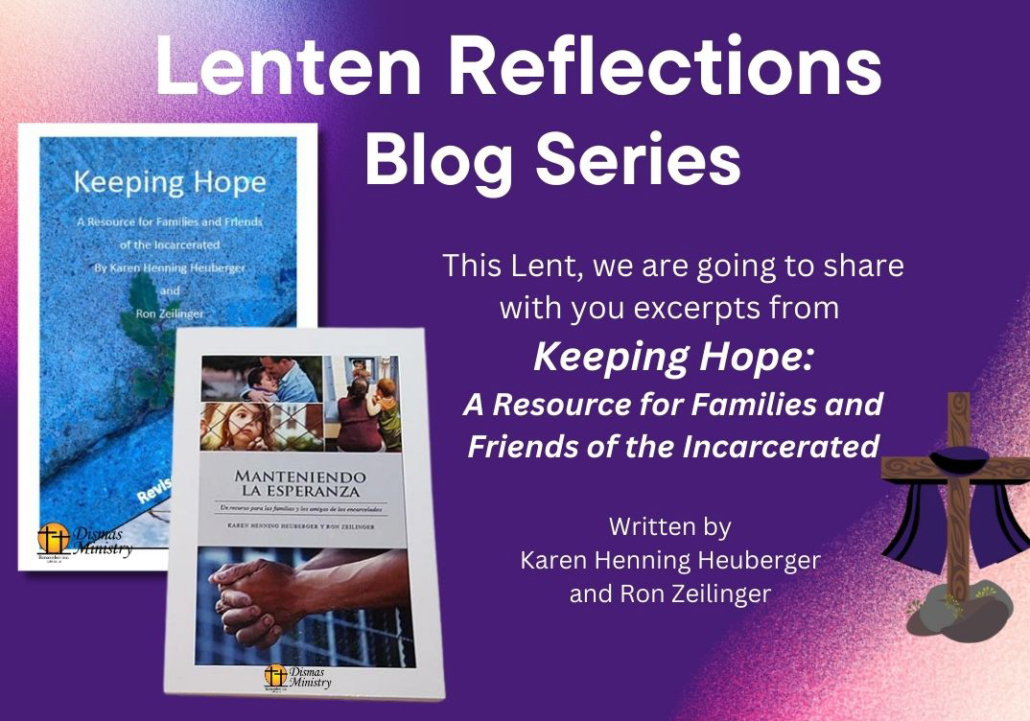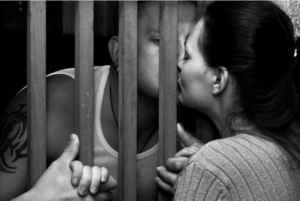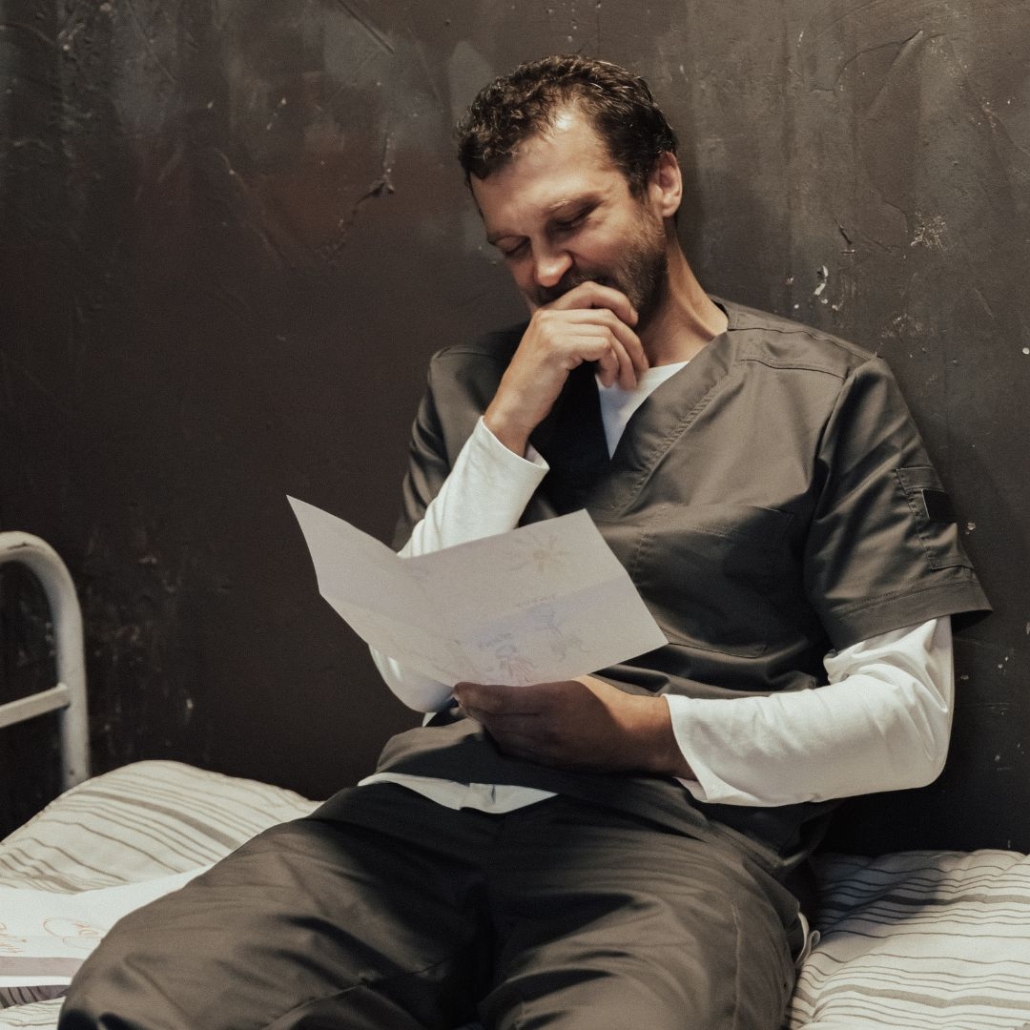This Lent, we are going to share with you excerpts from Keeping Hope: A Resource for Families and Friends of the Incarcerated
Written by Karen Henning Heuberger and Ron Zeilinger
“Helping Children Cope”
Various approaches can help children get through the challenges of having a loved one in prison. The adults in the children’s lives can encourage healing. Because children often follow the lead of the adults around them, you can help them through your own example – attitude and action. Children will feel the intensity of the emotion of the adults in their lives, so keeping a light heart, talking, and laughing with the children will help them to look toward the positives in their lives.
 Never speaking ill of the incarcerated helps the children maintain any positive emotions they have for their loved one. Also, when children see the adults forgive the family member, it can help them do likewise. Never pressure the children to move to forgiveness or even positive feelings for the loved one. Allow them to experience what they are feeling and then address their feelings through positive means.
Never speaking ill of the incarcerated helps the children maintain any positive emotions they have for their loved one. Also, when children see the adults forgive the family member, it can help them do likewise. Never pressure the children to move to forgiveness or even positive feelings for the loved one. Allow them to experience what they are feeling and then address their feelings through positive means.
Allow the children to initiate conversations about their absent loved ones, and let them take the lead in those conversations. Affirming their feelings, answering their questions age-appropriately, and simply letting them vent are all proper responses on your part. Some children will be more verbal about it than others. Some will move on with their lives more quickly. Others may need to work with a counselor or find a support group. Resources are available to help children deal with their emotional response to the situation.
Writing letters, talking on the phone, and visiting (if allowed) can help the children deal with the separation and maintain a relationship with their loved one. Especially when the incarcerated family member is a parent, this is vitally important. The Bureau of Justice statistics reveal that there are over 1,700,000 children under 18 in the United States who have one or more parents who are incarcerated. (Bureau of Justice Statistics Special Report: Parents in Prison and Their Minor Children, by Lauren E. Glaze and Laura M. Maruschak, BJS Statisticians, 2008, www.bjs.gov/index.cfm?ty=pbdetail&iid=823)
Sometimes children are not able to visit their loved one because of distance. Other times, they are not allowed to visit because of the particular crime committed. If the crime involved children, the inmate may not be allowed to be in contact with minors, even family members. This may be especially difficult if the children were close to the inmate.

Allowing the children to freely discuss the situation at home gives them a safe place to process all that is going on in their lives. Having other supportive family members outside of the home not only gives the children added support, but will also provide their caregivers an outlet. As mentioned earlier, letters and phone calls from their loved one can ease the anxiety of separation, especially if visiting is impossible due to distance or other reasons.
Informing the children’s school about the situation can help them find support there. While the children’s peers may not know – unless they choose to share their story – teachers and staff can observe the children and help with understanding whenever any issue arises.
Resources for Children
Books are often a source of comfort for children during this time. The Children of Incarcerated Parents Library has a book list for children of inmates posted on their web site. (See nrccfi.camden.rutgers.edu/resources/library/children-of-prisoners-library/.) The list is arranged by age. Another resource that may be available for children, depending on the facility where their loved one is located, involves incarcerated parents reading to their children on tape. The book and tape are then given to the children.
There are various programs that provide this service around the US. Some examples of such programs are Story Link in Missouri and Idaho, Project Storybook in New Jersey, the Women’s Storybook Project of Texas, and Lutheran Social Services of Illinois’ (LSSI) Prisoner & Family Ministry Storybook Project.
 Another program providing information and activities for children as well as advice for caregivers and service providers is Sesame Street’s new project, Little Children, Big Challenges: Incarceration (www.sesamestreet.org/toolkits/incarceration). In the usual Sesame Street style, this program uses videos, songs, and activities for children ages 3-8 to help them understand and deal with the challenges of having a loved one who is incarcerated. Big Brothers/Big Sisters and church programs can also offer support, providing mentors and involvement in positive ways. Programs such as these move the children’s focus away from the reminders of their loved one’s incarceration.
Another program providing information and activities for children as well as advice for caregivers and service providers is Sesame Street’s new project, Little Children, Big Challenges: Incarceration (www.sesamestreet.org/toolkits/incarceration). In the usual Sesame Street style, this program uses videos, songs, and activities for children ages 3-8 to help them understand and deal with the challenges of having a loved one who is incarcerated. Big Brothers/Big Sisters and church programs can also offer support, providing mentors and involvement in positive ways. Programs such as these move the children’s focus away from the reminders of their loved one’s incarceration.
Beyond these resources, counseling is a powerful tool to help children work through the feelings and experiences of having an incarcerated family member. Local counseling centers can provide individual therapists and may connect you with support groups for the children. Web sites such as APA.org can help you find a therapist in your area.
One of the best things you can do to help children in this situation, especially if you are their caretaker, is to find support for yourself. If you find healthy ways to meet your own needs in this trying time, you will better be able to support the children involved. Educating yourself on the needs of children with an incarcerated loved one will also give you the means to be there for the children.

READ MORE FROM KEEPING HOPE BY PURCHASING YOUR COPY ON OUR STORE PAGE.

 There is also the money that goes into his or her account for personal expenses at the prison commissary. Your loved one may need money for shoes, underwear, certain clothes, extra food, toiletries, paper and pens for classwork assignments or writing letters, and anything the prison doesn’t supply. Some have said that they budget $300 per month for the basics for their loved one.
There is also the money that goes into his or her account for personal expenses at the prison commissary. Your loved one may need money for shoes, underwear, certain clothes, extra food, toiletries, paper and pens for classwork assignments or writing letters, and anything the prison doesn’t supply. Some have said that they budget $300 per month for the basics for their loved one. Bills that are in your name, or held jointly with the offender, will remain your responsibility. Bills in the offender’s name, such as credit card accounts, are your loved one’s responsibility, not yours. Do not be hassled by banks or lenders to pay them. The one incarcerated will have to make arrangements for those. Since he or she has no income bankruptcy is often the only solution.
Bills that are in your name, or held jointly with the offender, will remain your responsibility. Bills in the offender’s name, such as credit card accounts, are your loved one’s responsibility, not yours. Do not be hassled by banks or lenders to pay them. The one incarcerated will have to make arrangements for those. Since he or she has no income bankruptcy is often the only solution.
 Children lose the daily support of a parent or significant adult as well. They may have to take on added responsibilities around the house which can result in resentment. They may feel abandoned or responsible for the incarceration and act out, either at home or at school. If any form of bullying occurs, instruct your children to report it to school authorities immediately before it escalates into violence.
Children lose the daily support of a parent or significant adult as well. They may have to take on added responsibilities around the house which can result in resentment. They may feel abandoned or responsible for the incarceration and act out, either at home or at school. If any form of bullying occurs, instruct your children to report it to school authorities immediately before it escalates into violence. From Those Who Know…
From Those Who Know… 
 You may be able to visit your loved one each week, or at least 2-3 times a month. Or you may visit only a few times a year due to travel and time constraints. For some of you, the distance may prevent you from visiting at all. When you do visit, if you are able, the main thing is to make the most of it and keep the conversation in a positive vein. You may have to find ways to keep your emotions in check, especially if you are angry with your loved one. In the early visits, you may want to know the truth of what happened when the crime was committed. Why did he or she do it? The truth is, sometimes your loved one may not even know. He or she may also play the “blame game” and may not be ready to take full responsibility. Or your loved one may be careful with what is shared so as not to hurt you. Don’t push your loved one to share. You may not know the emotional state your loved one will be in before you visit, so you need to be prepared for uncertainty during the visit. Over time, visiting usually gets easier. Keep your loved one up-to-date on family events, find ways to bring humor and to laugh, and be sure to express your love in some way. You can grow closer to your loved one during these visits. You can become your loved one’s true support person even if you have not been in the past.
You may be able to visit your loved one each week, or at least 2-3 times a month. Or you may visit only a few times a year due to travel and time constraints. For some of you, the distance may prevent you from visiting at all. When you do visit, if you are able, the main thing is to make the most of it and keep the conversation in a positive vein. You may have to find ways to keep your emotions in check, especially if you are angry with your loved one. In the early visits, you may want to know the truth of what happened when the crime was committed. Why did he or she do it? The truth is, sometimes your loved one may not even know. He or she may also play the “blame game” and may not be ready to take full responsibility. Or your loved one may be careful with what is shared so as not to hurt you. Don’t push your loved one to share. You may not know the emotional state your loved one will be in before you visit, so you need to be prepared for uncertainty during the visit. Over time, visiting usually gets easier. Keep your loved one up-to-date on family events, find ways to bring humor and to laugh, and be sure to express your love in some way. You can grow closer to your loved one during these visits. You can become your loved one’s true support person even if you have not been in the past. Writing Letters and Sending Packages
Writing Letters and Sending Packages

